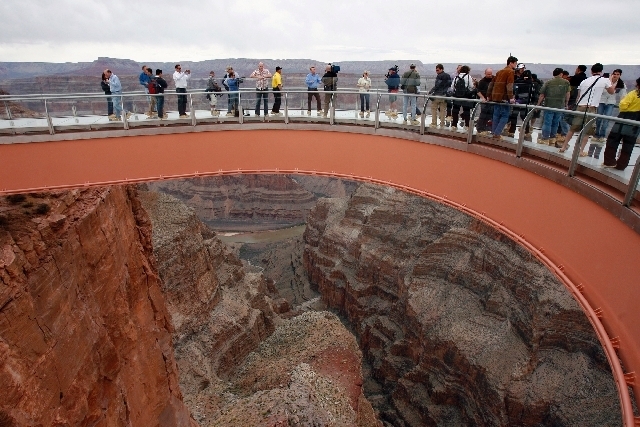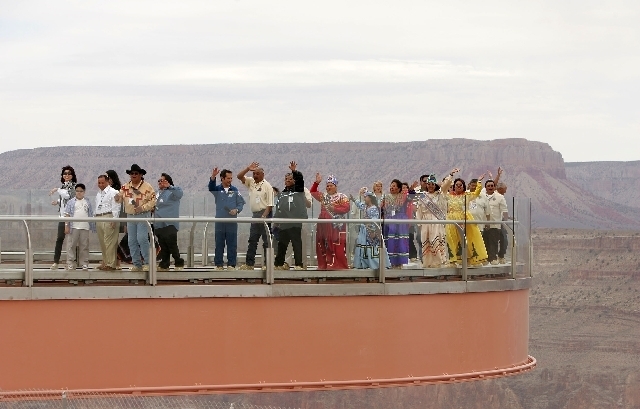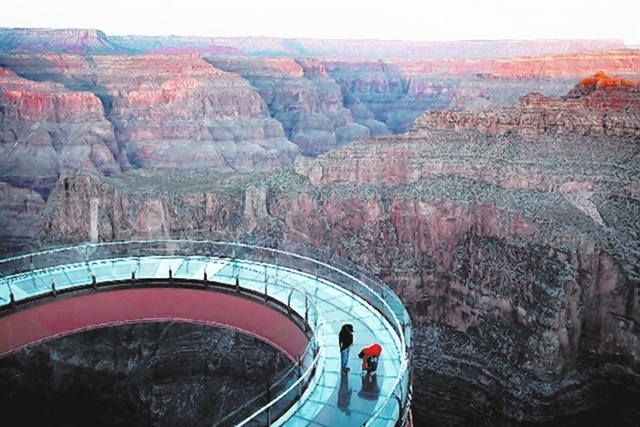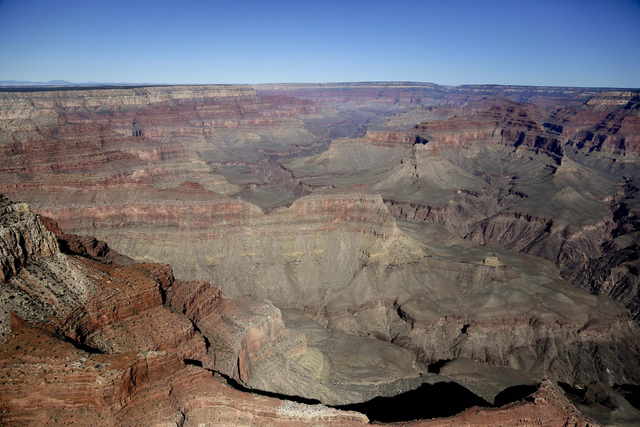Legal battle surrounding Grand Canyon Skywalk still flares
Even after a trip to the U.S. Supreme Court, the legal war surrounding the Grand Canyon Skywalk promises to continue on several fronts for months if not years.
In U.S. District Court in Las Vegas, attorneys for the late developer David Jin and Theodore Quasula, the Skywalk’s former general manager, have sued seven members of the Hualapai Tribe and their public relations counsel for defamation concerning out-of-court statements regarding the dispute. The Skywalk was built as the star tourist attraction to boost tourism on tribal land in Grand Canyon’s West Rim.
U.S. Magistrate Judge George Foley Jr. said at a Monday hearing that he would probably freeze the production of evidence by the tribal members until U.S. District Court Judge Jennifer Dorsey rules on their request to dismiss the case.
On Dec. 23, the two sides set up a schedule that will lead to an April 16 showdown to decide whether the bankruptcy reorganization plan of ‘Sa’ Nyu Wa Inc., filed in Arizona, passes legal muster. Created by the tribe a decade ago to partner with Jin on the Skywalk, the company was placed into Chapter 11 on March 4, just three weeks after a federal court in Arizona upheld an arbitrator’s decision that the tribe owes Jin $28.6 million.
The Supreme Court decided on Dec. 16 not to hear an appeal of an appellate decision that Jin must continue to fight in tribal court the Hualapai’s seizure of the Skywalk two years ago. Only after that has run its course can Jin try to move the matter to federal court.
Jin conceived of the Skywalk, a horseshoe-shaped walkway with a glass floor that juts 70 feet from the canyon rim, in 1996 as a way to sell more canyon tours. The previous year, he had started Oriental Tour and Travel in Las Vegas and built it into the West’s largest booker of Grand Canyon tours among Chinese nationals.
After the idea went nowhere for several years due to the lack of financing, Jin moved ahead as the lead and included ‘Sa’ Nyu Wan in a revenue sharing deal. Since it opened to international publicity in early 2007, the $30 million Skywalk has prospered; a financial report created for ‘Sa’ Nyu Wa’s bankruptcy showed revenues more than doubling from $7.9 million the opening year to $18.2 million in 2012, while initial net loss of $2.4 million has turned to a $7.5 million profit.
This has happened despite a ticket price of $76.10 per person, as part of a package, and an approach road that is unpaved for miles. Of the comments posted on tripadvisor.com, 417 gave the Skywalk excellent or very good grades and 490 rated it poor or terrible.
The relations between Jin and the tribe deteriorated not long after the opening, with each side trading accusations of not finishing the infrastructure, not paying fees and embezzlement by some tribe members. This culminated with the tribe taking over through condemnation in 2012 and the arbitrator awarding Jin the $28.6 million as compensation.
Jin attorney Mark Tratos filed the defamation action in April, two months before Jin died, because of what he characterized as the tribe’s attempt blame him for the Skywalk’s various problems.
“This was a completely made-up fabrication to ruin his name for one thing, so that the public would not feel bad when the tribe took (Skywalk) away,” Tratos said on Monday.
To back his allegations, Tratos included in court papers an undated strategy memo by the tribe’s public relations consultant Scutari &Cieslak. At one point, the memo outlined the public line as, “The Hualapai have begged Mr. Jin to keeps his promises and complete the work. Instead, Jin and his various subsidiaries have behaved like Arizona’s version of Leona Helmsley and Bernie Madoff … .”
But tribal attorney Thomas Ryan said that both sides have frequently turned to the media to make their cases. He characterized the lawsuit as an attempt to “chill the basic right of freedom of speech … and affront the sovereignty of the Hualapai Tribe.”
In the ‘Sa’ Nyu Wa bankruptcy, $15.3 million in two bank accounts comprise almost all the assets. The tribe has shifted all the rights and operations for the Skywalk to a different company.
In addition, the tribe has submitted a claim for $20.2 million in taxes and various fees, which would stand higher on the repayment ladder than Jin. Jin, on the other hand, says he is owed $405.9 million to cover the arbitration award plus estimated income from the revenue sharing and management agreement that ran through 2028.
Both sides contest not only the numbers but also the legitimacy of the claims. Jin’s attorneys, in particular, have depicted the bankruptcy as a subterfuge to let the tribe to keep the Skywalk and erase the arbitration award.
Contact reporter Tim O’Reiley at toreiley@reviewjournal.com or at 702-387-5290.




















